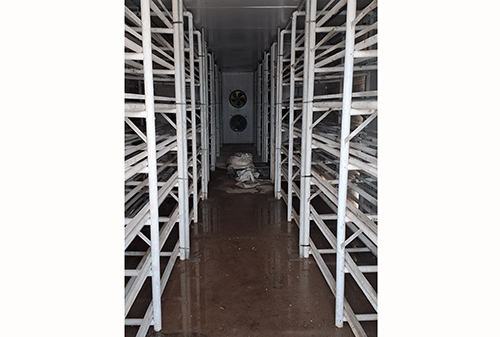Cecilia Xavier
OTJOKAVARE – The Ehi-rovipuka hydroponic fodder project in the Kunene region came to a standstill after the solar battery died in June 2021. Attempts from the project management to replace it had proven futile.
The Ehi-rovipuka Hydroponic Fodder is food for livestock project that was funded by the Environmental Investment Fund and handed over to the Ehi-rovipuka Conservancy in 2022.
The project was producing barley grass to cater for energy and protein for the livestock. Furthermore, the project was expected to feed up to 500 cattle per day. Harvest is done after seven days of planting.
Hydroponics is the technique of growing plants, using a water-based nutrient solution rather than soil.
According to the Ehi-rovipuka Conservancy chairperson Meundju Siegfriedt Muzuma, the battery died as a result of high concentration of lime in water, blocking the irrigation system.
“We were advised to find a new battery or install electricity. Quotations were made both for the new battery and electricity… the installation of electricity will cost around N$13 000, while buying a new battery is about N$35 000, but we do not have funds available for such purchases yet,” Muzuma said.
He noted that money generated from selling the fodder was not sufficient to cater for the cost; however, there is a saving estimate of N$12 000. The project sold fodder to the community at N$50 per tray; a tray can feed one goat only.
“We sold a bit of it, but while we thought the farmers are getting used to it, the problem came. The reaction from the farmers was perfect. They didn’t know about it, but after we gave them free samples, they came back with feedback that it was real, and they started to buy,” Muzuma stated.
Marukuavi Murorua, a farmer who benefited from the hydroponic fodder, expressed his disappointment when he heard that the project is no longer functioning and wished that a solution is found soon.
“I bought three trays at a time for the small goats; first, the goats didn’t like the fodder because they were not used to it, so one had to teach them. But after a while, they got used to it. The fodder is good; I would like the project to be revived,” Murorua said.
He noted that some farmers do not always have money to keep buying the fodder but will make means to buy for their livestock to survive the drought season.
Muzuma indicated that the project received 150 goats from the small stock project and they now have about 400 goats.
The board meeting will be held to decide on selling some goats to generate money to resolve the battery issue. He estimated the price of a goat at N$1 300.


